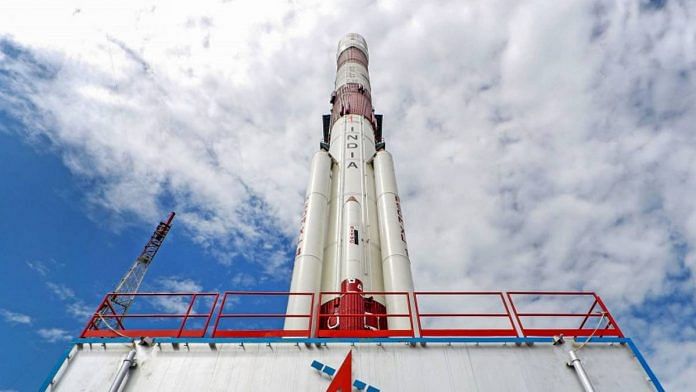Bengaluru: Thanks to India’s well-developed space programme, the satellite manufacturing sector is likely to grow to $3.2 billion in market value in 2025 from $2.1 billion in 2020, while launch services will surge to $1 billion in 2025 from $567.4 million in 2020, a new report by the Indian Space Association (ISpA) and Ernst & Young (EY) has projected.
In the downstream segments, ground services are expected to grow to $4 billion in 2025 from $3.1 billion in 2020, while satellite services are projected to grow to $4.6 billion by 2025 from $3.8 billion in 2020. With the four segments together, India’s space economy will garner close to $13 billion in revenue in 2025, compared to around $9.6 billion in 2020.
The report was released Monday at the 2022 Indian Space Conclave in New Delhi. Titled ‘Developing the Space Ecosystem in India: Focusing on Inclusive Growth’, it highlights the state of the space economy and makes growth projections for the next three years.
The ISpA was formed last year and is a non-profit body comprising representatives from the space and telecom industries.
According to the report, the highest compound annual growth rate (CAGR) — 13 per cent — is projected for satellite and launch services in the next three years, while 8.1 per cent CAGR is likely for satellite manufacturing, 6.9 per cent for the ground segment, and 4.2 per cent for satellite services.
The report further makes policy and regulatory recommendations to the Government of India aimed at helping the space industry become a self-sustaining model instead of continuing to operate purely under the purview of the government.
Some of the suggestions include building a comprehensive space policy, providing access to capital for early-stage startups, access to satellite technology for industry, improved training for satellite operations, and allowing private players to use the Indian Space Research Organisation’s (ISRO) testing facilities.
Also mentioned are recommendations for skill development, including tie-ups with private universities, and for technology transfer from ISRO. The report outlines key considerations applicable to multiple departments in India’s defence domain that it says are conducive to innovation and ease of doing business.
“India sits at a crossroads with a unique and rare opportunity space for a new industry as no other developing economy like Brazil, China, or South Africa has the capability to deliver satellite services,” Narayan Prasad, a key contributor to the report and co-founder of Spaceport SARABHAI, India’s first space think tank, told ThePrint.
“After 50 years of experience with space activities and applications, there’s a massive opportunity to encourage talent and capacity across the board from startups, SMEs and large companies,” he added.
Also read: This is how govt plans to bring together ISRO, private players to boost India’s space sector
Indian space startup industry
The Indian space startup industry has been rapidly growing in the past five years, with over 50 startups operating today in both the upstream (satellite manufacturing, launch services) and downstream (ground segments such as consumer equipment, and data services like voice commutation or navigation).
The industry has historically been led by ISRO with limited participation from the private sector. Under the agency, the space programme is broadly thought to be divided into three parts: satellites, space transportation and space applications. The existing policy and regulatory framework are built around this structure with a monopoly by ISRO.
As more and more countries successfully work with private agencies (as NASA in the US and the European Space Agency do), private companies and industry representatives in India have been calling for a more conducive and collaborative framework within which they can operate in conjunction with ISRO.
The Indian government has taken steps such as introducing draft policies for space communication, navigation, and remote sensing to enable easier participation by private companies. However, experts have said that the process has not been keeping pace with technological developments.
“The government needs to put into action its intent of opening up of the space sector by formally announcing a policy framework that provides trust to both entrepreneurs and investors,” said Prasad. “This will help continue bullish efforts in making India a hub for space-based technology and services for both local and global markets.”
According to the EY-ISpA report, the global space economy in 2020 was worth $447 billion — with 27 per cent being government space budgets, 36 per cent ground equipment, 32 per cent satellite services, 3 per cent satellite manufacturing, and 1 per cent launch services. It is projected to be worth $600 billion in 2025.
The year 2020 saw the greatest number satellite launches of any year, at 1,283, primarily due to the development and launch of economical CubeSats (a class of miniaturised satellites). The report says that 84 per cent of satellites manufactured in 2020 were used for commercial communications, followed by remote sensing, military surveillance, scientific missions, and navigation.
(Edited by Nida Fatima Siddiqui)
Also read: How can India get its own Elon Musk? ISRO Chair Somanath says agency has key role to play



